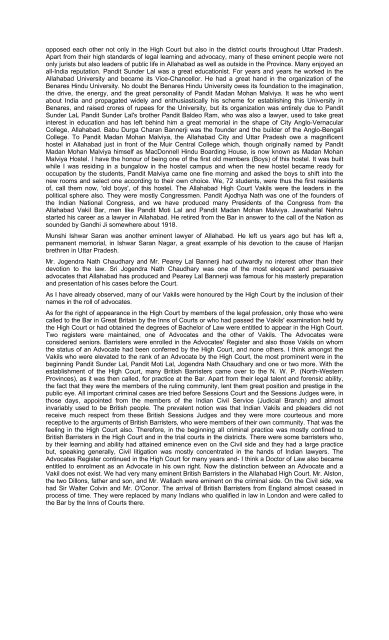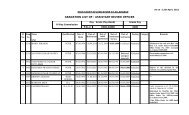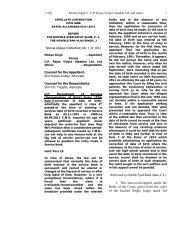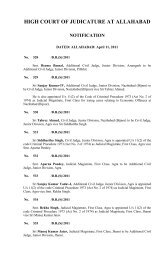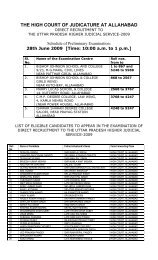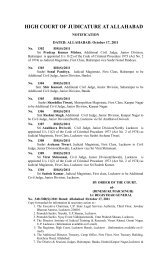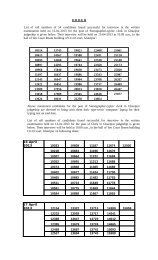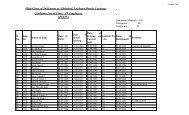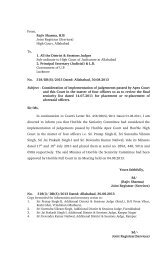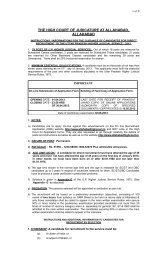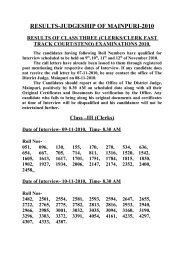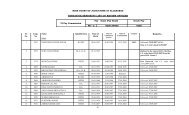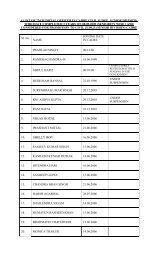Some Judges and Lawyers Whom I Knew By DR. KAILAS NATH ...
Some Judges and Lawyers Whom I Knew By DR. KAILAS NATH ...
Some Judges and Lawyers Whom I Knew By DR. KAILAS NATH ...
You also want an ePaper? Increase the reach of your titles
YUMPU automatically turns print PDFs into web optimized ePapers that Google loves.
opposed each other not only in the High Court but also in the district courts throughout Uttar Pradesh.Apart from their high st<strong>and</strong>ards of legal learning <strong>and</strong> advocacy, many of these eminent people were notonly jurists but also leaders of public life in Allahabad as well as outside in the Province. Many enjoyed anall-India reputation. P<strong>and</strong>it Sunder Lal was a great educationist. For years <strong>and</strong> years he worked in theAllahabad University <strong>and</strong> became its Vice-Chancellor. He had a great h<strong>and</strong> in the organization of theBenares Hindu University. No doubt the Benares Hindu University owes its foundation to the imagination,the drive, the energy, <strong>and</strong> the great personality of P<strong>and</strong>it Madan Mohan Malviya. It was he who wentabout India <strong>and</strong> propagated widely <strong>and</strong> enthusiastically his scheme for establishing this University inBenares, <strong>and</strong> raised crores of rupees for the University, but its organization was entirely due to P<strong>and</strong>itSunder LaL P<strong>and</strong>it Sunder Lal's brother P<strong>and</strong>it Baldeo Ram, who was also a lawyer, used to take greatinterest in education <strong>and</strong> has left behind him a great memorial in the shape of City Anglo-VernacularCollege, Allahabad. Babu Durga Charan Bannerji was the founder <strong>and</strong> the builder of the Anglo-BengaliCollege. To P<strong>and</strong>it Madan Mohan Malviya, the Allahabad City <strong>and</strong> Uttar Pradesh owe a magnificenthostel in Allahabad just in front of the Muir Central College which, though originally named by P<strong>and</strong>itMadan Mohan Malviya himself as MacDonnell Hindu Boarding House, is now known as Madan MohanMalviya Hostel. I have the honour of being one of the first old members (Boys) of this hostel. It was builtwhile I was residing in a bungalow in the hostel campus <strong>and</strong> when the new hostel became ready foroccupation by the students, P<strong>and</strong>it Malviya came one fine morning <strong>and</strong> asked the boys to shift into thenew rooms <strong>and</strong> select one according to their own choice. We, 72 students, were thus the first residentsof, call them now, 'old boys', of this hostel. The Allahabad High Court Vakils were the leaders in thepolitical sphere also. They were mostly Congressmen. P<strong>and</strong>it Ajodhya Nath was one of the founders ofthe Indian National Congress, <strong>and</strong> we have produced many Presidents of the Congress from theAllahabad Vakil Bar, men like P<strong>and</strong>it Moti Lal <strong>and</strong> P<strong>and</strong>it Madan Mohan Malviya. Jawaharlal Nehrustarted his career as a lawyer in Allahabad. He retired from the Bar in answer to the call of the Nation assounded by G<strong>and</strong>hi Ji somewhere about 1918.Munshi Ishwar Saran was another eminent lawyer of Allahabad. He left us years ago but has left a,permanent memorial, in Ishwar Saran Nagar, a great example of his devotion to the cause of Harijanbrethren in Uttar Pradesh.Mr. Jogendra Nath Chaudhary <strong>and</strong> Mr. Pearey Lal Bannerji had outwardly no interest other than theirdevotion to the law. Sri Jogendra Nath Chaudhary was one of the most eloquent <strong>and</strong> persuasiveadvocates that Allahabad has produced <strong>and</strong> Pearey Lal Bannerji was famous for his masterly preparation<strong>and</strong> presentation of his cases before the Court.As I have already observed, many of our Vakils were honoured by the High Court by the inclusion of theirnames in the roll of advocates.As for the right of appearance in the High Court by members of the legal profession, only those who werecalled to the Bar in Great Britain by the Inns of Courts or who had passed the Vakils' examination held bythe High Court or had obtained the degrees of Bachelor of Law were entitled to appear in the High Court.Two registers were maintained, one of Advocates <strong>and</strong> the other of Vakils. The Advocates wereconsidered seniors. Barristers were enrolled in the Advocates' Register <strong>and</strong> also those Vakils on whomthe status of an Advocate had been conferred by the High Court, <strong>and</strong> none others. I think amongst theVakils who were elevated to the rank of an Advocate by the High Court, the most prominent were in thebeginning P<strong>and</strong>it Sunder Lal, P<strong>and</strong>it Moti Lal, Jogendra Nath Chaudhary <strong>and</strong> one or two more. With theestablishment of the High Court, many British Barristers came over to the N. W. P. (North-WesternProvinces), as it was then called, for practice at the Bar. Apart from their legal talent <strong>and</strong> forensic ability,the fact that they were the members of the ruling community, lent them great position <strong>and</strong> prestige in thepublic eye. All important criminal cases are tried before Sessions Court <strong>and</strong> the Sessions <strong>Judges</strong> were, inthose days, appointed from the members of the Indian Civil Service (Judicial Branch) <strong>and</strong> almostinvariably used to be British people. The prevalent notion was that Indian Vakils <strong>and</strong> pleaders did notreceive much respect from these British Sessions <strong>Judges</strong> <strong>and</strong> they were more courteous <strong>and</strong> morereceptive to the arguments of British Barristers, who were members of their own community. That was thefeeling in the High Court also. Therefore, in the beginning all criminal practice was mostly confined toBritish Barristers in the High Court <strong>and</strong> in the trial courts in the districts. There were some barristers who,by their learning <strong>and</strong> ability had attained eminence even on the Civil side <strong>and</strong> they had a large practicebut, speaking generally, Civil litigation was mostly concentrated in the h<strong>and</strong>s of Indian lawyers. TheAdvocates Register continued in the High Court for many years <strong>and</strong>- I think a Doctor of Law also becameentitled to enrolment as an Advocate in his own right. Now the distinction between an Advocate <strong>and</strong> aVakil does not exist. We had very many eminent British Barristers in the Allahabad High Court. Mr. Alston,the two Dillons, father <strong>and</strong> son, <strong>and</strong> Mr. Wallach were eminent on the criminal side. On the Civil side, wehad Sir Walter Colvin <strong>and</strong> Mr. O'Conor. The arrival of British Barristers from Engl<strong>and</strong> almost ceased inprocess of time. They were replaced by many Indians who qualified in law in London <strong>and</strong> were called tothe Bar by the Inns of Courts there.


